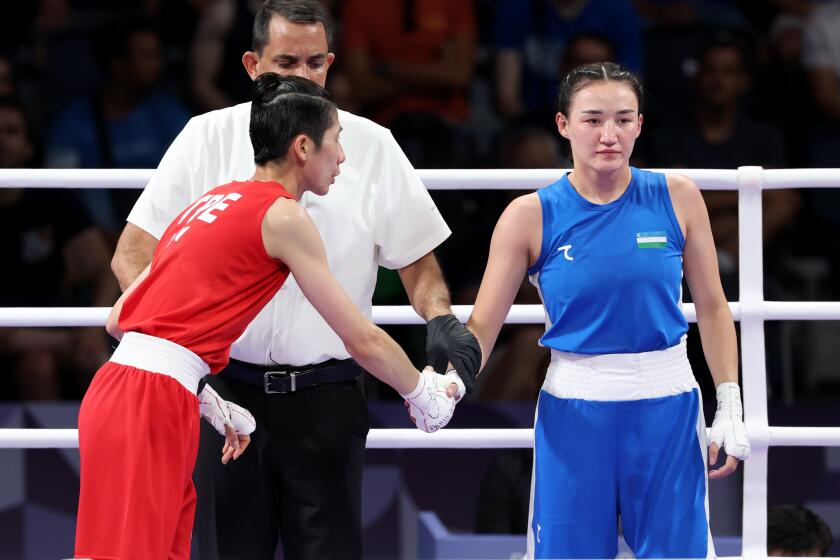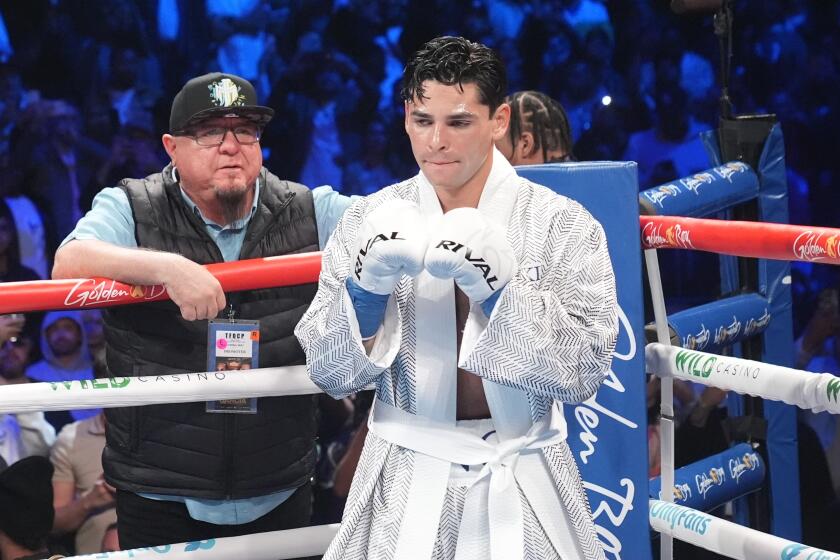Arum Paints a Dark Picture
Promoter Bob Arum, voluntarily testifying without immunity in June in the New Jersey racketeering trial of boxing figure Bob Lee, painted a detailed picture of the sport’s underbelly--from secret payments to money laundering, from shadowy bagmen to blatant bribery, according to transcripts of the four-day testimony obtained by The Times.
Arum’s most damaging admission is that he secretly agreed to pay Lee, former president of the International Boxing Federation, $100,000 to sanction a 1995 heavyweight title fight between George Foreman and Axel Schulz.
That admission caused the Nevada State Athletic Commission and several other state commissions, including California’s, to launch investigations. Arum, who promoted the Oscar De Hoya-Shane Mosley fight at Staples center in June, is tentatively scheduled to appear before the California State Athletic Commission in October.
In New Jersey, the jury is into its third week of deliberations in the trial of Lee and his son, Robert Jr., on charges of conspiracy, racketeering, fraud and tax evasion. The Lees, who have maintained their innocence, were unavailable for an interview.
Arum will come before the Nevada commission today, although his lawyers and commission representatives have already reached a nonbinding agreement that the 68-year-old, Nevada-based promoter will be fined $125,000 and have restrictions placed on his license for six months. That includes a prohibition against attending weigh-ins and entering dressing rooms or the ring.
The five commission members, however, can opt for a stiffer penalty after interrogating Arum in today’s public hearing. They could revoke his license and levy a fine of up to $250,000.
The agreement has not been universally applauded.
“You can’t have a man confess, and then let him off,” said promoter Don King, Arum’s archrival and, according to sources, a potential target of prosecutors in the New Jersey trial.
“Under that type of justice, the government will eventually fall. If I had confessed, do you think I will still be here free? Here is a guy who confessed and they are still out to get me. If a voice came down from heaven and asked me if I was guilty, I would say, ‘No, I ain’t.’
“This is a double standard that chinks away at the essence of this country.”
Other promoters who testified against the Lees in New Jersey were Cedric Kushner and Dino Duva. King was not asked to testify.
Transcripts obtained by The Times of Arum’s four days of testimony reveal not only details of the payment to Lee but also:
* Arum’s payment of $500,000 to a fellow promoter in the early 1980s to guarantee a fight.
* Arum’s payment in 1992 of $10,000 to promoter Ron Weathers that Weathers, on his own, used to try and influence Lee.
The Lee Payment
When Foreman returned to boxing in 1987 after a 10-year absence, Arum wanted no part of the former heavyweight champion. Arum testified that Foreman had to do a selling job over the phone just to get a meeting with the promoter.
That 1987 meeting, however, changed everything.
“It blew me away,” Arum testified, “because this was the worst guy, really [referring to Foreman of a decade earlier]. I met bad guys in boxing, but Foreman was terrible. And suddenly, the guy I meet in ’87 . . . I mean, you couldn’t meet a nicer person.”
So Arum agreed to promote some Foreman fights, including a 1994 match in which he regained the WBA and IBF heavyweight titles against Michael Moorer.
Foreman next wanted to fight Schulz, a German who was not ranked by the IBF. In December of 1994, Arum, Lee and Stan Hoffman, a fight manager, met at New York’s Mayfair Hotel.
“My intention,” Arum testified, “was to convince Mr. Lee to sanction a fight between George Foreman and Axel Schulz.” Later on in the questioning, Arum was asked what was said at the meeting.
ARUM: I started talking about Axel Schulz and what a good fighter he was, and that he was very popular in Germany, and it was a good fight for George Foreman to have.
Q: What did Mr. Lee, Sr., say in response to that?
ARUM: Mr. Lee, Sr., interrupted me, in effect, while I was making this pitch and said to me that, ‘Bob, you have to understand that the IBF has always been in George’s corner while the other organizations have not. And that we expect to receive compensation of more than just the sanction fee for Foreman’s fights.’
Q: And did Mr. Lee, Sr., indicate how much more than the usual sanction fee he was looking for?
ARUM: My recollection is that he asked for $500,000.
Q: And what did you say in response to that?
ARUM: First, I didn’t see any reason for anything extra to be paid, and then $500,000 was totally crazy and out of the question.
Q: You and Mr. Lee continued to discuss money after that?
ARUM: Yes.
Q: OK, could you tell us how that conversation went?
ARUM: Well, we continued discussing the issue and, ultimately, we agreed on a payment of $200,000, $100,000 to be paid before the fight and $100,000 after.
Q: Who came up with the $200,000 figure, if you can recall?
ARUM: It was a process of negotiation. I’m not sure.
On cross-examination, Arum was asked if he felt Lee was extorting him.
ARUM: I considered myself at that point to having been extorted, yes.
Q: You were the victim of this extortion or shakedown?
ARUM: But that doesn’t make what I did proper.
Q: Well, you considered yourself the victim there though, right?
ARUM: But I still should have known better and what I did was improper . . . I just want that to be made clear because you look at me and I hardly look like a victim. And what I did was and what I agreed to was clearly improper . . . And I regret it.
In further testimony, Arum said that Lee wanted the money to approve a Foreman/Schulz fight in cash. Hoffman suggested that a check be written to a Dutch promoter, Peter Blaumert, who would cash the check and give the money to Hoffman who, in turn, would pass it on to Lee.
Arum’s first payment, on Jan. 23, 1995, was for $50,000, made out to Blaumert. A second $50,000 check to Blaumert followed in April.
Q: With respect to this [first] check, sir, your assumption was, you were going to disguise the payment to Mr. Lee, right?
ARUM: Yes.
Later on in the testimony:
Q: Are you familiar with the term money laundering, sir?
ARUM: Yes.
Q: Do you understand that to be the disguising of illegal proceeds, or an illegal instrument in order to make it look like it’s something legitimate? Are you familiar with that?
ARUM: I’m familiar with that term.
Q: Do you understand money laundering to be a federal offense?
ARUM: Yes.
Q: And did you, when you made the assumption that’s how this check would be handled, did you say to yourself, gee, I’ve just been shaken down and now I’m cutting a side deal with Hoffman to launder $50,000?
ARUM: No.
Q: No, that didn’t occur to you?
Arum: Unfortunately, it didn’t.
Doubt was cast in court whether Lee received the money from Hoffman.
It was also revealed that Arum only paid half of the $200,000 after being led to believe Foreman had paid $250,000 on his own to the IBF. According to trial documents, Foreman said that the money was a “consulting fee,” given to promoter Butch Lewis to lobby the IBF to approve the Schulz fight.
Foreman won a split-decision over Schulz in April of 1995 in Las Vegas.
Later on in the New Jersey testimony, Arum was asked if there was any discussion in his meeting with Lee about a future fight between Foreman and Mike Tyson.
ARUM: Yes, there was a statement that he [Lee] made that, if and when . . . Foreman fights Tyson--who was then in jail--that he [Lee] would expect at least four times as much.
Q: What did you say to that?
ARUM: I didn’t say anything.
No fight was ever held between Foreman and Tyson.
The WBA Payoff
In 1983, Arum told Ring Magazine that he paid $500,000 to promoter Pepe Cordero in order to set up a fight between Ray Mancini and Arturo Frias, then the WBA lightweight champion. Arum once referred to Cordero as “a bagman” for the WBA.
Cordero, since deceased, denied the Arum story when it came out.
“[Cordero] really dictated what the WBA did,” Arum testified in New Jersey. “He was not an official. He was a promoter, but he had the clout.”
According to Arum’s testimony, Cordero got the WBA to rule that his fighter, Ernesto Espana, must fight Frias before Mancini if Frias wanted to keep his title.
Frias beat Espana by decision when the bout was stopped because of an accidental head butt. But, Arum said, Cordero got the WBA to question the decision and rule that Espana deserved an immediate rematch.
“[The WBA] told me, go to Puerto Rico and meet with Pepe Cordero, which is what I did,” Arum testified. “And Cordero took me to the cleaners. He said, OK, Espana would step aside for a payment, I think it was $250,000, let Mancini fight Frias and then, if Mancini won the fight, he was obligated to fight Espana for another $250,000.”
Mancini beat Frias and Arum paid Cordero $500,000.
“That was the only way you could do business in those days,” Arum told The Times in 1999. “Now, if it looks like it has to be done, I try to stay away.”
In the New Jersey courtroom, Arum said he wouldn’t characterize the money he paid to Cordero as a bribe.
The Weathers Payment
On November 10, 1992, Arum wrote a check for $10,000 to Ron Weathers, his co-promoter on some Foreman fights.
The money was, according to Arum’s testimony, “an advance on his [Weathers] participation and promotional profits.”
Arum was asked if Weathers told him what the money was for.
ARUM: He said that he was going to cash the check and pay $10,000 in cash to Bobbie Lee to get [Francois] Botha [then also a Weathers fighter] rated.
Q: Now what did you say when Mr. Weathers told you what the purpose of the money was for?
ARUM: I don’t remember. I remember laughing.
Weathers, who confirmed in an interview with The Times that he made the payment to the IBF, was attempting to set up a Foreman-Botha fight, a fight Arum thought wasn’t worthy of Foreman.
Q: Prior to providing that check to Mr. Weathers, did you have any understanding of what the money was going to be used for?
ARUM: No.
Q: Now after Mr. Weathers told you what the money was going to be used for, did you continue to do business with him?
ARUM: Yes.
Q: Why is that?
ARUM: He was George Foreman’s promoter . . . He was the one that had the relationship with Foreman, having promoted so many more of Foreman’s comeback fights than we had.
Before his testimony concluded, Arum pleaded his case when asked why he had first revealed the details of the payment to Lee in a 1996 interview with an FBI agent.
“Because I felt that it was time,” Arum testified, “to do what I could to end the corruption in boxing in order to help rescue what was, for the general community, a dying sport because of the machinations which had been going on in boxing.”
More to Read
Go beyond the scoreboard
Get the latest on L.A.'s teams in the daily Sports Report newsletter.
You may occasionally receive promotional content from the Los Angeles Times.










